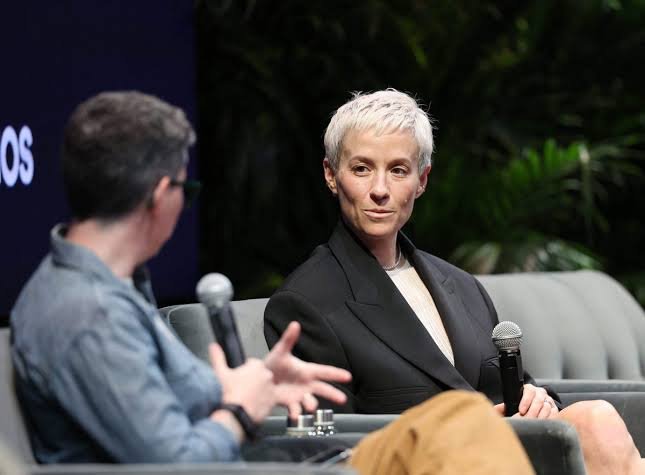
Megan Rapinoe, the outspoken former U.S. Women’s National Team soccer star, has once again stirred controversy by defending Caitlin Clark, a prominent WNBA player, over her comments regarding “white privilege.” Rapinoe, never one to shy away from discussing social issues, offered her support for Clark, who had faced significant backlash after acknowledging the existence of white privilege. In addition to backing Clark, Rapinoe seized the opportunity to criticize conservative media for its negative reaction, claiming that the attacks revealed much about the current state of public discourse on race and privilege.
Rapinoe and her partner, former WNBA player Sue Bird, co-host a podcast called “A Touch More,” where they frequently tackle topics related to sports and societal issues. On a recent episode, they delved into Clark’s controversial remarks, with Rapinoe taking a strong stance in favor of the Indiana Fever star. According to Rapinoe, Clark’s comments were simply a candid acknowledgment of her own privilege, a subject that, in Rapinoe’s view, should be embraced rather than criticized. She asserted that the backlash Clark faced was a clear example of how conservative figures are unwilling to engage in meaningful conversations about race.
During the podcast, Rapinoe remarked that Clark was “speaking explicitly about her white privilege,” and suggested that the criticism Clark received was an unfortunate consequence of societal discomfort with honest discussions about race. Rapinoe’s comments reflect her ongoing belief that American society, particularly conservative elements of it, resists confronting issues of racial inequality. By defending Clark, Rapinoe positioned herself as an advocate for these difficult conversations, despite the backlash they often provoke.
While Rapinoe’s defense of Clark might be expected, her direct attack on conservative media further highlights the deepening political divide in the U.S. surrounding discussions of race and privilege. Rather than simply supporting Clark, Rapinoe used the platform to take aim at conservative viewpoints, accusing them of perpetuating a culture of denial when it comes to acknowledging the realities of systemic racism and privilege. Her comments resonate with those who agree that these issues must be confronted head-on but are likely to alienate conservative audiences who view such discussions as divisive.
Ultimately, Rapinoe’s remarks serve as a reminder of the ongoing cultural battle over how race is discussed in America. While some see her as a champion for progress and inclusion, others view her stance as a further politicization of an already contentious issue. Whether or not Rapinoe’s bold stance will influence public opinion or simply reinforce existing divides remains uncertain, but her willingness to engage in these challenging conversations continues to make her a prominent voice in the debate over race and privilege.



